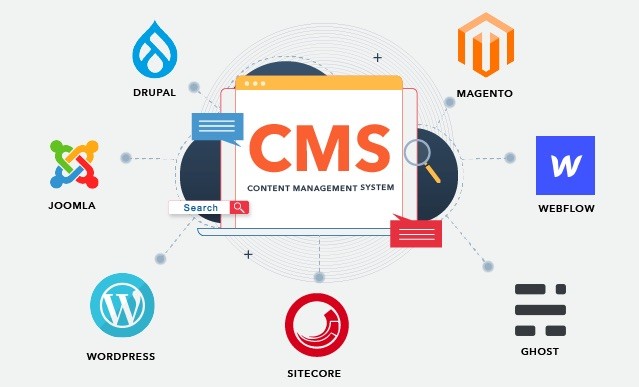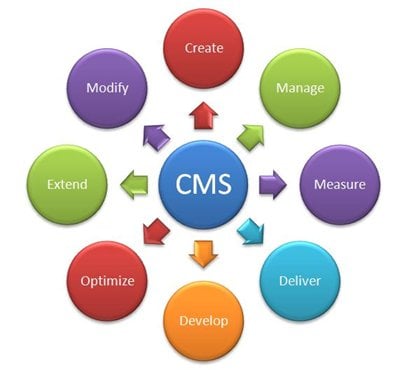
Mastering CMS: Your Guide to Hosting Excellence
CMS – In today’s digital age, having a robust online presence is crucial for businesses and individuals alike. Whether you’re running a blog, an e-commerce store, or a corporate website, your choice of Content Management System (CMS) and hosting provider can significantly impact your site’s performance, security, and user experience. In this guide, we’ll explore how to master CMS and achieve hosting excellence for your website.

Understanding Content Management Systems (CMS)
A Content Management System is software that allows users to create, manage, and modify content on a website without needing to have specialized technical knowledge. Popular CMS platforms include WordPress, Joomla, Drupal, and many others. Here are key aspects to consider when choosing a CMS:
- Ease of Use: Choose a CMS that matches your technical expertise. WordPress, for instance, is known for its user-friendly interface and extensive plugin ecosystem.
- Customization: Evaluate the CMS’s flexibility in terms of design and functionality. Look for themes and plugins that can be easily customized to fit your specific needs.
- Community Support: Opt for a CMS with a large and active community. This ensures ongoing development, security updates, and a wealth of resources and forums for troubleshooting.
Selecting the Right Hosting Provider
Once you’ve chosen a CMS, selecting the right hosting provider is equally critical. Hosting directly affects your site’s speed, reliability, and security. Consider the following factors when choosing a hosting provider:
- Performance: Look for hosting providers that offer fast loading times and minimal downtime. Factors such as server location, caching mechanisms, and SSD storage can all impact performance.
- Security: Ensure your hosting provider offers robust security measures, such as SSL certificates, regular backups, and malware scanning. A secure hosting environment protects your website and user data from cyber threats.
- Scalability: Your hosting provider should be able to accommodate your website’s growth. Choose a provider that offers scalable plans and resources, such as bandwidth and storage, to handle increased traffic and content.
- Support: Reliable customer support is crucial, especially during technical issues or downtime. Opt for a hosting provider with 24/7 support through multiple channels, such as live chat, phone, and email.
Optimizing Your Website for Performance
.png?width=650&height=433&name=My%20Featured%20Image%20Template%20Backgrounds%20(2).png)
Once your CMS and hosting are in place, optimize your website for optimal performance and user experience:
- Content Optimization: Regularly update and optimize your content for SEO. Use plugins or tools provided by your CMS to improve your site’s search engine rankings.
- Image and File Compression: Compress images and files to reduce load times without compromising quality. Utilize caching plugins or CDN (Content Delivery Network) services to serve content faster to users worldwide.
- Mobile Responsiveness: Ensure your website is responsive and performs well on mobile devices. Many CMS platforms offer responsive themes or plugins to help achieve this.
- Regular Maintenance: Perform regular updates of your CMS, themes, and plugins to ensure compatibility, security, and performance enhancements.What are different CMS available?There are numerous Content Management Systems (CMS) available, each with its own features, strengths, and use cases. Here are some of the most popular CMS platforms:
- WordPress: WordPress is the most widely used CMS globally, powering over 40% of all websites on the internet. It’s known for its ease of use, extensive plugin ecosystem, and flexibility for various types of websites from blogs to e-commerce stores.
- Joomla: Joomla is another popular open-source CMS that offers a balance between flexibility and ease of use. It’s suitable for websites that require more complexity and customization options than basic blogging sites.
- Drupal: Drupal is a powerful CMS known for its scalability and flexibility, making it ideal for large, complex websites and applications. It offers robust security features and is favored by developers for its customization capabilities.
- Magento: Magento is a CMS specifically designed for e-commerce websites. It offers a wide range of features tailored for online stores, including product catalog management, customer accounts, and payment processing integrations.
- Shopify: Shopify is a hosted e-commerce platform that provides a comprehensive CMS specifically for online stores. It’s known for its ease of use, scalability, and built-in features for managing products, orders, and payments.
- Wix: Wix is a user-friendly CMS that allows users to create websites using drag-and-drop tools and templates. It’s suitable for beginners and small businesses looking to create a professional-looking website quickly.
- Squarespace: Squarespace is another user-friendly CMS that offers beautifully designed templates and intuitive tools for creating websites. It’s popular among creatives and small businesses for its aesthetic appeal and ease of use.
- Ghost: Ghost is a CMS specifically designed for blogging, offering a minimalist interface and focused features for content creators. It’s known for its speed and simplicity, making it ideal for personal blogs and publications.
- TYPO3: TYPO3 is a robust enterprise-level CMS that offers extensive customization options and scalability. It’s favored by large organizations and institutions that require complex website structures and multilingual support.
- ModX: ModX is a flexible CMS known for its ability to create custom websites and applications. It offers advanced customization features and is suitable for developers looking to build highly tailored websites.
These are just a few examples of the diverse range of CMS platforms available. The choice of CMS depends on factors such as your website’s purpose, complexity, scalability requirements, and your own technical expertise. Each CMS has its strengths and may cater better to specific types of websites or user preferences.
Conclusion
Mastering CMS and achieving hosting excellence involves selecting the right CMS platform, choosing a reliable hosting provider, and optimizing your website for speed, security, and user experience. By understanding these key factors and implementing best practices, you can create a powerful online presence that engages visitors and achieves your business goals.
Whether you’re launching a new website or looking to improve an existing one, mastering CMS and hosting excellence is a continuous journey. Stay informed about industry trends, regularly evaluate your website’s performance, and adapt to the evolving needs of your audience and business.
Start your journey today and unlock the full potential of your website with a solid foundation in CMS and hosting excellence!